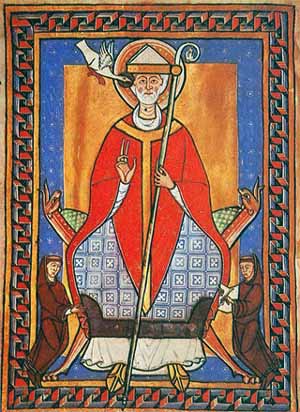 |
World History
St. Gregory VII Excommunicates
Emperor Henry IV
Johann Baptist Weiss
Henry IV, Holy Roman German Emperor, (1) thought that his title of Emperor was greater than that of the Pope. This resulted in one of the greatest fights that the Papacy experienced in its History. (2)
In 1075 the Pope’s legates invited King Henry IV to go to Rome in Easter week to give an account of himself before a Synod and answer to the accusations made against him. Should he not appear, he would be excommunicated. The King contemptuously expelled the Legates and called a Synod in Worms in January of 1076.
Those who gathered there declared the Pope deposed on the grounds that his ambition had blinded him to distort the social order and treat the Bishops as slaves.
In a decree to the Romans, Henry IV called St. Gregory a traitor of the Roman Republic and the German Empire. His letter of January 24, 1076 to the Pope begins with these words: “Henry, King not through usurpation but through the holy ordination of God, to Hildebrand, at present not pope but false monk.”
In a similar way, the Italian enemies of the Pope dealt with the Pope at a Synod of Piacenza and sent messengers to other regions so that they might do the same.

St. Gregory VII was not a man to be intimidated |
But Gregory VII was not a man to be intimidated. He convoked those who remained faithful to him at a Synod in the Lateran Church in Lent of 1076. On that occasion, Roland, a cleric of Parma, informed the meeting of the decrees of the King and also stated that St. Gregory VII was no longer Pope, but a furious wolf. The cleric would have been torn to pieces if Gregory VII himself had not intervened to save him. The Prelates who signed the decrees at Worms were then excommunicated.
After various canons about the penalties of disobedience were read and after those present had requested that the Pope use the spiritual sword so that the just might see the evil punished, St. Gregory VII pronounced the anathema of the King with these words:
“O St. Peter, chief of the Apostles, I beseech you to incline to us your holy ears and hear your servant whom you have nourished from infancy, and whom, until this day, you have freed from the hands of the wicked, who have hated and do hate me for my faithfulness to you. You, and my Mistress, the Mother of God, and your brother St. Paul are witnesses for me among all the Saints that the Holy Roman Church drew me to its helm against my will; that I had no thought of ascending to your chair through force, and that I would rather have ended my life in exile than, by secular means, to have seized your throne for the sake of earthly glory.
“Therefore, I believe it to be through your grace and not through my own deeds that it has pleased and does please you that the Christian people, who have been especially committed to you, should obey me. And to me specially, as your representative and by your favor, has the power been granted by God of binding and loosing in Heaven and on earth.
“Therefore, confiding in this belief and for the honor and security of your Church, in the name of Almighty God, Father, Son and Holy Ghost, I withdraw, through your power and authority, from Henry the King, son of Henry the Emperor, who has risen against your Church with unheard of insolence, the rule over the whole Kingdom of the Germans and over Italy. And I release all Christians from the bonds of the oath that they have made or shall make to him; and I forbid any one to serve him as King. For it is fitting that he who strives to lessen the honor of the Church should himself lose the honor which belongs to him.
"And since he has scorned to obey as a Christian, and has not returned to God whom he had deserted - holding intercourse with the excommunicated; practicing manifold iniquities; spurning my commands which, as you do bear witness, I issued to him for his own salvation; separating himself from your church and striving to rend it - I bind him in your place with the chain of the anathema. And, leaning on you, I so bind him that the people may know and have proof that you are Peter, and above your rock the Son of the living God has built His church, and the gates of Hell shall not prevail against it."
1. King of Germany from 1056 and Holy Roman Emperor from 1084 until his forced abdication in 1105.
2. The confrontation started when Henry IV, in opposition to the Pope’s mandate that only the Pontiff could name and invest Bishops and Abbots, appointed the next Bishop of Milan, a candidate through whom he could control Northern Italy.

Translated by TIA desk from História Universal, vol. 5, pp. 340-341
Posted April 17, 2010

Related Topics of Interest
 Pope St. Gregory VII Pope St. Gregory VII
 The Paternity of St. Gregory VII The Paternity of St. Gregory VII
 The World’s Pope The World’s Pope
 Urban II Calls for the First Crusade Urban II Calls for the First Crusade
 The Grandeur of Pius IX in the Fight for the Papal States The Grandeur of Pius IX in the Fight for the Papal States
 R-CR in the Tendencies, Ideas, and Facts R-CR in the Tendencies, Ideas, and Facts

Related Works of Interest
|
|
History | Home | Books | CDs | Search | Contact Us | Donate

© 2002- Tradition in Action, Inc. All Rights Reserved
|
 |
|